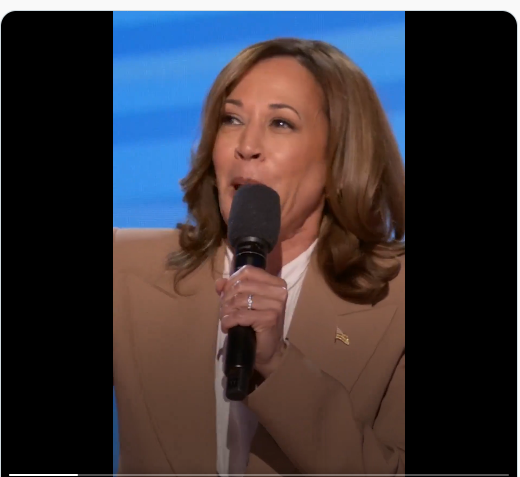
(Photo : X account)
- Kamala Harris has accepted the Democratic Party's 2024 presidential nomination, marking a historic moment in American politics.
- Harris pledged to be a "president who unites" Americans and criticized her Republican rival, Donald Trump.
- She outlined her policy priorities, including a middle-class tax cut and protection of Social Security and Medicare.
- Harris's nomination echoes the 1984 Democratic National Convention when Geraldine Ferraro became the first female vice-presidential candidate representing a major American political party.
In a historic moment that marks a significant milestone in American politics, Kamala Harris, the Vice President of the United States, has formally accepted the Democratic Party's 2024 presidential nomination. This announcement came during her address at the Democratic National Convention held at Chicago's United Center. Harris, who is of Indian origin, is set to compete against her Republican rival, Donald Trump. If successful, she will become the first woman US president, breaking a significant glass ceiling in American politics.
Harris's acceptance of the nomination was not just a personal triumph but a symbol of hope and unity for many Americans. She pledged to be the president who unites Americans, regardless of party, race, gender, or language. She emphasized the importance of moving past the bitterness, cynicism, and divisive battles of the past and charting a new way forward as Americans.
Harris's journey to this pivotal moment was not without its challenges. She became the Democratic candidate after President Joe Biden, 81, was forced to quit the race for the White House. Despite the unexpected path that led her to accept the nomination, Harris demonstrated her resilience and determination, stating, "I'm no stranger to unlikely journeys."
Harris's Critique of Trump and Pledge to Unify the Nation
During her address, Harris did not shy away from criticizing her Republican rival, Donald Trump. She warned of the potential consequences of a Trump win, stating, "Just imagine Donald Trump with no guardrails. How he would use the immense powers of the presidency of the United States, not to improve your life, but to serve the only client he has ever had... himself." She characterized Trump as an unserious man whose actions are fundamentally self-serving and not in the interest of typical Americans.
Harris also made a direct appeal to Republicans, independents, and undecided voters, pledging to unify the nation. She emphasized her commitment to upholding the nation's core principles, including the rule of law, free and fair elections, and the peaceful transfer of power. She also promised to stand with NATO allies and with Ukraine, amid concerns over Trump's criticism of the military alliance.
In her speech, Harris also remembered her mother, Shyamala Gopalan, who she described as tough and courageous. She credited her mother's influence for her drive to fight for justice and equality. Harris's mother, who was 19 when she crossed the world alone from India to California, instilled in her daughters the values of hard work, social justice, and the importance of never complaining about injustice but doing something about it.
Harris's Policy Priorities and the Road Ahead
Harris's acceptance speech was not just about her personal journey and political aspirations. She also outlined her policy priorities, promising to pass a middle-class tax cut, provide access to capital for small business owners and entrepreneurs, and protect Social Security and Medicare. She also pledged to fight against cartels who traffic in guns, drugs, and human beings, threatening the security of the border and the safety of communities.
Harris's historic nomination and her pledge to be a president for all Americans have been met with widespread support. However, the road to the White House is not without its challenges. As the election approaches, Harris called on voters to be guided by optimism and to fight for a better future. As she concluded her speech, she said, Together, let us write the next great chapter in the most extraordinary story ever told.
This historic event echoes the 1984 Democratic National Convention when Geraldine Ferraro became the first female vice-presidential candidate representing a major American political party. Like Ferraro, Harris's nomination represents a significant step forward in the ongoing fight for gender equality in American politics. However, unlike Ferraro, who ultimately did not win the vice presidency, Harris stands on the precipice of becoming the first female president of the United States, a testament to the progress made in the intervening four decades.









